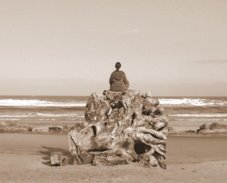In her bodydeath, I realize that she was the most influential person of my adolescence. The first person to love me unconditionally in a way I could recognize and respond to. The first Christian whom I met who wasn’t a hypocrite, but truly lived her life following Jesus’ footsteps. It is hard to imagine that I didn’t learn from her, from them, about the texture of adoption; it must have been from them that I integrated it as an organic possibility, an “of course” rather than a noble task. So much I learned, took into my soul at the cellular level, from this woman I call my “German mother.”
I was still 16 years old. It was about a month after arriving in West Germany and living with this miraculous family, with this German mother and father and sister who seemed more mine than the one I had left behind in America, I attended a party. It was hosted by the German man responsible for a group of us exchange students placed with families in his region. He sought me out, asked how I was doing, how I was getting along with my exchange family. For anyone who has been an exchange student, you know that the family with whom one lives can make or break the experience. This well-meaning man approached me, let me know that the family with whom I was placed wasn’t “an ordinary German family” and if I wanted, he could find me a new family right away.
I was mildly shocked, but also had to laugh. Gudrun, her husband, Walfryd, their daughter Christiane, and their son Carsten, and their other daughter, Hannah, and I had already talked about how they weren’t “typisch Deutsch” – and that I was not a typical American – and that this suited us just fine. It was a match made in heaven – or so they would say. Gudrun and Walfryd would sometimes say that I was a Gottesgeschenk – a gift from God. Though atheist at that time, I was in full concurrence in the most secular of ways. Christiane and I, a month apart in age, were fast friends, attending many classes together at the Albert Einstein Gymnasium, introducing me to hand rolling cigarettes, strange new (to me) rock music, and a decidedly European sensibility.
Gudrun was practical and loving and real and funny and believed deeply in integrity. She grew up afraid of balloons because they could pop and sound too much like the bombs that exploded when she was a child during WW II. She was German through and through and knew deep in her heart that her father, conscripted into the German army was no Nazi, but was also misguided, narrow-minded, and wrong in his dislike for “Amis” (of which I was one).
Living with the Albrechts introduced me to political activism as one’s daily life. They didn’t buy fruit from South Africa, a boycott movement guided by their Lutheran church. They spent time and money assisting a young unwed mother who was struggling. They had recent immigrants over to tea or dinner, helped them navigate the less than friendly German welfare system. They told stories of their best friends, Peter and Hannah, who were living in Namibia, trying to add to a small village there, rather than let historical German colonialism take its toll on the impoverished country.
They called me their daughter and I believed them. Not their exchange student, but their daughter. They gave me money – little bits, but like what they offered their own children. They took me to Paris. They took me to Brugge. They showed me the farm where Walfryd grew up as young boy, lost from his family torn apart by the war, too young to have been forced to be part of the Nazi youth movement.
This amazing family took me in during my most humbling, painful time (so far, at least), when I had done the meanest thing I had ever done to another human being – they took me in with open arms and when I told them what I had done, they were no different towards me. That unconditional love they granted me gave me the ability to acknowledge what I had done, to myself and to that person, to take full responsibility and to return.
I stayed with them over and over again – any time I could return to Germany. The first year was 1984-5, but then I went back in ’87 and ’88, brought friends. The last time I went was in April of 1998 – a few months after her last surgery and a month before the remission of Walfryd’s cancer ended. It was a golden time.
Gudrun had constant pain, nearly her whole life, her back so fragile and inclined towards weakness. She did not complain much, tried to hide her suffering – probably thought it was the Christian way to bear it. Over and over she sought medical relief for this. In the end, it was the final seeking: surgery for her back that brought with it brain damage from the anesthesia. Again, so German, so non-American: they never thought to sue the doctors or the hospital. It was just a misfortune.
One that ate away at her brain capacity, decreased significantly when her loving, guiding husband, on whom she relied, died of prostate cancer. Eventually she became a danger to herself, leaving the stove on, walking in her neighborhood of 30 years and getting lost. Eventually, she became the shell, but not the inside. The soul has long been gone, with a body suffering, howling in a nursing home bed, for the past five years. Now, this past Tuesday, her body has died. This coming Tuesday her body will be buried next to her husband’s, her father’s, her mother’s in the village cemetery. I am so sorry that I will not be there.
Subscribe to:
Post Comments (Atom)





No comments:
Post a Comment